ATTO Disk Benchmark is perhaps one of the oldest benchmarks going and is definitely the main staple for manufacturer performance specifications. ATTO uses RAW or compressible data and, for our benchmarks, we use a set length of 256mb and test both the read and write performance of various transfer sizes ranging from 512b to 65mb. Manufacturers prefer this method of testing as it deals with raw (compressible) data rather than random (includes incompressible data) which, although more realistic, results in lower performance results.
Initial ATTO results are a bit lower than expected as listed specs are 5GB/s read and 4.4GB/s write. There is a healthy progression in performance pictured which leads us to believe that this is a very well put together SSD.
CRYSTAL DISK BENCHMARK VER. 0.0 X64
Crystal Disk Benchmark is used to measure read and write performance through sampling of random data which is, for the most part, incompressible. Performance is virtually identical, regardless of data sample so we have included only that using random data samples.
THROUGHPUT
IOPS
Very strong performance is shown in both the throughput and IOPS results of the newest version of Crystal Diskmark 7 although write performance is just a touch below manufacturers specifications. Gotta love those random 4K IOPS above 700k,
The toughest benchmark available for solid state drives is AS SSD as it relies solely on incompressible data samples when testing performance. For the most part, AS SSD tests can be considered the ‘worst case scenario’ in obtaining data transfer speeds and many enthusiasts like AS SSD for their needs. Transfer speeds are displayed on the left with IOPS results on the right.The AS SSD results aren’t as appealing as we might like to see but do get a first look at read and write IOPS which appear to be in the general ball park of listed specs.
AS SSD is pretty much a mixed bag with throughput result similar to ATTO, all the while hitting 4GB/s write IOPS just below listed specs. We can guess that the benchmark software we are used to might not be completely in tune with the newest Gen 4.
 The SSD Review The Worlds Dedicated SSD Education and Review Resource |
The SSD Review The Worlds Dedicated SSD Education and Review Resource | 


Would be good to see some more details. Do these support multiple LBA formats and if so which ones? Do they support more than one namespace? How much data was written before running these benchmarks?
We don’t test multiple LBA formats and, with respect to namespace, the same applies for any SSD that is divided into one or more logical drives. I wouldn’t believe you could create one or more namespaces using multiple SSDs as the flash relies on each controller separately. Similarly, we are not testing this SSD as an enterprise SSD or at different levels of data present on the sample drive.
It does seems like the pci4. 0 have not mu h performance gain compared to Samsung 970 evo plus.